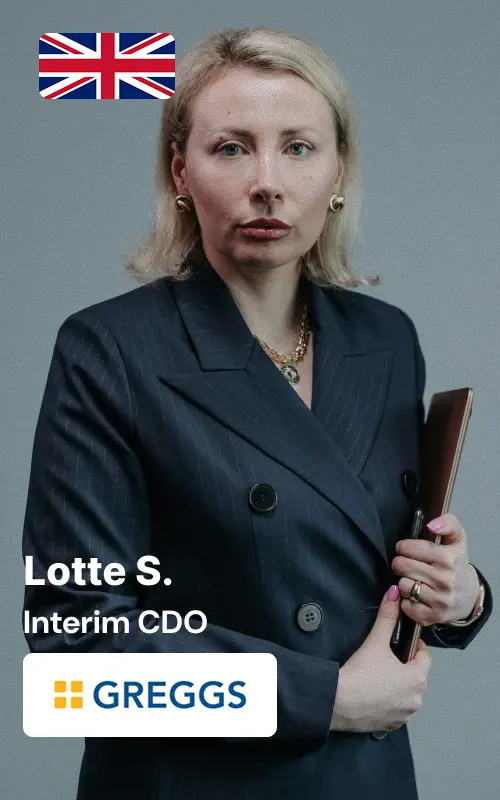Access
Interim Managers in Europe
- Establish operational priorities
- Map critical stakeholders and decision-makers
- Streamline business processes and workflows
- Create strategic execution plans

Update for 2025
Understanding the new era of interim management
The strategic guide to interim Management in Europe
In today’s volatile business landscape, the European interim management market represents one of the world’s most mature and developed sectors, with the INIMA network alone covering 11 countries and over 2,500 members. In the mean time many European companies still face critical leadership gaps that traditional recruitment cannot address within their growth timelines. Whether navigating post-pandemic transformation, managing rapid international expansion, or leading complex digital initiatives, organizations increasingly turn to interim management as their strategic weapon of choice.
Interim management represents far more than temporary leadership—it’s the art of deploying battle-tested executives who can deliver transformational results within finite timeframes. Unlike traditional consulting that provides recommendations, interim managers take operational responsibility, driving implementation while building internal capabilities for sustained success.
This comprehensive guide reveals how European interim management has evolved beyond crisis firefighting to become an essential growth catalyst. Our goal is to help you better hire your interim manager.
From understanding regulatory complexities across the UK, Germany, Netherlands, Spain, and France, to accessing specialized fractional marketing leadership, we’ll explore how interim management can accelerate your organization’s trajectory.
What you’ll discover:
- Strategic applications of interim management beyond traditional stopgap solutions
- European regulatory landscape navigation (IR35, ZZP, Scheinselbständigkeit)
- Fractional vs. interim executive differentiation for optimal ROI
- Market-leading practices for interim CMO and marketing leadership deployment
- Cross-border interim management strategies for international scale-ups
Let’s explore how your organization accesses world-class leadership talent. Let’s learn about the strategic advantage that’s reshaping European business execution.


What is the secret behind Interim Management practice in Europe?
Interim management is the temporary deployment of seasoned executives and senior managers to address specific business challenges, leadership gaps, or strategic initiatives within defined timeframes. Unlike permanent hires or consulting engagements, interim managers combine hands-on operational responsibility with the agility to rapidly mobilize and deliver measurable outcomes.
The European Interim Management Evolution
The concept originated in the Netherlands during the 1970s, where rigid employment laws made workforce flexibility essential. Today, the European interim management market has matured into a sophisticated ecosystem spanning multiple specializations and geographic territories.
Let’s dive into the key market indicators across Europe:
- UK: 20% of senior managers work on interim basis annually
- Netherlands: €2.1 billion interim market with 45,000+ active professionals
- Germany: Growing 8% annually, driven by digital transformation needs
- Spain: Emerging market with 68% growth in recent years
- France: Established interim tradition in executive functions
| Country | Market Maturity | Active Managers | Key Characteristics |
|---|---|---|---|
| Netherlands | Mature/Originator | ~10,000 | Birthplace of interim management, highest acceptance |
| Germany | Mature/Large | ~15,000 | Highest utilization (70%), largest market value |
| United Kingdom | Mature/Developed | ~8,000-10,000 | Strong financial sector focus, traditional market |
| France | Growing Rapidly | ~6,000-8,000 | 34% growth H1 2023, €285M annual value |
| Switzerland | Specialized/Premium | ~2,500-3,000 | High rates, specialized international projects |
| Belgium | Moderate Growth | ~3,000-4,000 | Crisis/restructuring focus, growing market |
| Italy | Emerging/Fragmented | ~2,000-3,000 | 52% part-time assignments, SME focused |
| Spain | Developing | ~1,500-2,000 | 38% part-time work, lower utilization |
Fractional vs. Interim Management: What is the strategic differentiation ?
While often used interchangeably, fractional executives and interim managers serve distinct strategic purposes:
Fractional Executives:
- Part-time engagement model (1-3 days per week)
- Long-term strategic partnerships (6-18+ months)
- Ideal for scale-ups requiring senior expertise without full-time commitment
- Cost-effective access to C-level experience
Interim Managers:
- Full-time intensive engagement
- Project-specific or transition-focused missions (3-12 months)
- Crisis management and rapid transformation delivery
- Complete operational responsibility and authority
For exemple at Mateerz we offer both Fractional CMO and Interim CMO depending on our clients needs.
How and when Interim Management drives maximum impact ?
1. Digital transformation leadership
European businesses undergoing digital transformation require leaders who’ve navigated similar journeys across multiple organizations. Interim Chief Digital Officers and Marketing Technology Leaders bring proven frameworks while building internal digital capabilities.
Strategic advantage: Access battle-tested methodologies without long-term commitment risks.
2. International market entry and expansion
Expanding across European markets demands local regulatory knowledge combined with international business acumen. Interim executives provide immediate market-specific expertise while establishing sustainable local operations.
Critical competencies include:
- Multi-jurisdiction compliance (GDPR, labor laws, tax regulations)
- Cultural adaptation and local network activation
- Rapid team building and operational setup
3. Scale-Up growth management
European scale-ups often experience leadership capability gaps during rapid growth phases. Fractional CMOs and interim marketing directors provide senior marketing expertise precisely when traditional hiring timelines would miss critical market windows.
4. Merger & acquisition integration
M&A transactions require specialized leadership to navigate cultural integration, operational alignment, and stakeholder management. Interim executives bring neutral perspective and integration expertise across European business environments.
5. Crisis and turnaround management
When organizations face financial distress, regulatory challenges, or operational crises, interim managers provide immediate stabilization expertise. Their external perspective enables difficult decisions while preserving long-term stakeholder relationships.

European Regulatory Landscape: how to navigate compliance across jurisdictions
United Kingdom: IR35 and Off-Payroll Working
The IR35 legislation fundamentally impacts interim management arrangements in the UK, determining tax treatment and engagement structures for interim professionals.
Key compliance considerations:
- Status determination: Client responsibility for IR35 assessment
- Contract structure: Ensuring genuine business-to-business arrangements
- Working practices: Maintaining independence indicators (substitution rights, control, integration)
Best practices for IR35 compliance:
- Engage specialists for status determination statements
- Structure contracts through limited companies with appropriate terms
- Document independence evidence throughout engagement
Netherlands: ZZP regulations and DBA considerations
ZZP (Zelfstandige Zonder Personeel) regulations govern independent contractor relationships in the Netherlands, with recent DBA (Deregulering Beoordeling Arbeidsrelaties) changes impacting interim arrangements.
Critical compliance elements:
- Economic independence: Multiple client relationships and risk assumption
- Operational independence: Own tools, workspace, and working methods
- Entrepreneurial activity: Marketing, business development, and growth activities
Germany: Scheinselbständigkeit and employment law
German Scheinselbständigkeit (false self-employment) regulations require careful structuring of interim management relationships to avoid inadvertent employment classification.
Compliance framework includes:
- Entrepreneurial independence: Multiple clients, own business premises
- Professional autonomy: Specialized expertise and independent decision-making
- Economic risk: Variable income and business investment
Spain and France: Emerging regulatory frameworks
Both Spain and France maintain evolving regulatory approaches to interim management, with increasing alignment to broader European employment directives.
Strategic considerations:
- Social security obligations: Country-specific contractor registration requirements
- Tax optimization: Cross-border assignment structuring for EU mobility
- Employment protection: Balancing flexibility with worker classification compliance

Hire your next interim leader
Get the best of interim marketing leadership :
→ Interim Marketing Manager
→ Interim CMO
→ Interim Marketing Director
→ Interim VP Marketing
→ Interim Chief Digital Officer
→ Interim Growth Director
→ Interim Chief Revenue Officer
Explore a wide range of interim managers part of Mateerz Ecosystem :
→ Interim CEO
→ Interim CFO
→ Interim HR Director
→ Interim Chief Of Staff
→ Interim Legal Councel
→ Interim COO
Our strong conviction about the future: Fractional Leadership will be the driving force at the intersection of full-time and interim leadership.
The rise of Fractional CMOs in European companies
Fractional Chief Marketing Officers represent the fastest-growing segment of interim management, particularly among technology scale-ups and innovation-driven organizations. This model provides immediate access to senior marketing expertise without the financial commitment of permanent C-level hires.
Strategic applications for Fractional marketing leadership
1. Go-to-Market Strategy Development
- European market entry strategy and localization
- Product-market fit validation across diverse cultural contexts
- Competitive positioning and differentiation strategy
2. Marketing Technology Implementation
- MarTech stack optimization and integration
- Customer data platform strategy and deployment
- Marketing automation and lead generation systems
3. Brand and Digital Marketing Transformation
- Brand positioning for European market expansion
- Digital marketing strategy across multi-channel ecosystems
- Content marketing and thought leadership development
4. Team Building and Capability Development
- Marketing team structure and hiring strategy
- Performance management and KPI framework implementation
- Skills development and mentoring for internal teams

ROI Analysis: Fractional vs. Permanent Marketing Leadership
| Leadership Model | Annual Investment | Time to Value | Risk Profile |
|---|---|---|---|
| Permanent CMO | €180,000 - €300,000+ | 6-12 months | High (long-term commitment) |
| Fractional CMO | €80,000 - €150,000 | 2-4 weeks | Low (flexible terms) |
| Marketing Consultant | €100,000 - €200,000 | 3-6 months | Medium (limited implementation) |
Data based on European market analysis across UK, DE, NL, ES, FR markets.
The Interim Management process: how we go from nothing to strategy to implementation
Phase 1: Strategic assessment and requirements definition
Stakeholder alignment begins with comprehensive assessment from Mateerz team of organizational needs, timeline constraints, and success criteria. This phase involves:
- Leadership gap analysis: Identifying specific skill deficiencies and capability requirements
- Cultural fit assessment: Understanding organizational dynamics and integration requirements
- Objective setting: Defining measurable outcomes and project deliverables
- Timeline planning: Establishing realistic milestones and transition planning
Phase 2: Candidate sourcing and selection
European interim management requires access to pre-vetted professionals with cross-cultural competencies and regulatory expertise. Our selection process encompasses:
Candidate evaluation criteria:
- Proven track record: Demonstrable success in similar organizational contexts
- Cultural adaptability: Experience across European business environments
- Regulatory knowledge: Understanding of local compliance requirements
- Language proficiency: Communication capabilities for local market engagement
Phase 3: Integration and rapid value delivery
Successful interim engagements require accelerated integration protocols that maximize immediate impact while building long-term organizational capabilities.
Integration best practices:
- Stakeholder mapping: Rapid identification of key decision-makers and influencers
- Quick wins identification: Early victories that build credibility and momentum
- Knowledge transfer: Documentation and process development for sustainability
- Mentoring and development: Building internal team capabilities for future independence
Phase 4: Transition and legacy planning
Strategic transition planning ensures sustainable impact beyond the interim engagement period, with focus on:
- Knowledge documentation: Comprehensive process and strategy documentation
- Team development: Skills transfer and capability building for internal teams
- Successor preparation: Whether internal promotion or external permanent hire
- Performance measurement: ROI analysis and outcome verification

Industry-Specific Interim Management Applications
Technology and Software Scale-Ups
European tech companies leverage interim management for rapid scaling challenges including:
- Product-market fit optimization across diverse European markets
- Marketing technology integration and customer acquisition scaling
- International expansion strategy and local market penetration
- Fundraising and investor relations management during growth phases
Manufacturing and Industrial
Traditional European industries utilize interim management for:
- Digital transformation initiatives and Industry 4.0 implementation
- Supply chain optimization and logistics modernization
- Sustainability and ESG compliance program development
- Operational excellence and lean manufacturing deployment
Financial Services and FinTech
Regulatory complexity in European financial services creates demand for:
- Compliance and regulatory affairs expertise across multiple jurisdictions
- Digital banking transformation and customer experience optimization
- Risk management and governance framework implementation
- Market expansion and license acquisition support
How to Measure Interim Management Succes ?
Quantitative success metrics
Return on Interim Management (RoIM) measurement requires comprehensive tracking of both direct and indirect value creation:
Financial Metrics:
- Revenue impact: New business generation and market expansion results
- Cost optimization: Operational efficiency gains and expense reduction
- Time to market: Acceleration of product launches and strategic initiatives
- Risk mitigation: Avoided costs through expert navigation of complex challenges
Operational Metrics:
- Project delivery: On-time, on-budget completion rates
- Team development: Skills enhancement and capability building metrics
- Process improvement: Efficiency gains and operational optimization
- Knowledge transfer: Documentation quality and sustainability indicators
Qualitative impact assessment
Strategic value creation extends beyond financial metrics to encompass:
- Organizational learning: Knowledge acquisition and capability development
- Cultural transformation: Change management and evolution facilitation
- Stakeholder satisfaction: Client, team, and partner relationship enhancement
- Strategic positioning: Market position strengthening and competitive advantage
European market benchmarks
Industry analysis across European interim management engagements reveals:
- Average engagement ROI: 3:1 to 8:1 return on investment
- Project success rate: 85%+ achieve primary objectives
- Client satisfaction: 90%+ report positive outcomes
- Repeat engagement rate: 60%+ utilize interim services multiple times
Better than words, let’s explore our case studies
From continuity to optimization: successfully managing marketing leadership during maternity leave

Working 3 days a week, Ludovic, ex-Head of Growth at Ledger, was able to ensure the continuity of the projects while making a valuable contribution to the business. He helped the company to better promote their contemporary art investment model and increase their visibility in this niche market.
How an interim CMO management helped our B2B saas client restructure their marketing

TalkSpirit called on Mateerz to hire an interim CMO with international B2B SaaS experience. Working 3 days a week, Georges, ex-VP Growth at Sunday and Too Good To Go, brought his expertise to developing the company’s marketing strategy in alignment with the new positioning until the new full-time CMO was appointed.
Some client testimonials
Exploring
interim management ?
FAQ
What is the difference between interim management and consulting?
Interim managers take full operational responsibility and accountability for results, working as integrated team members with decision-making authority. Consultants typically provide analysis and recommendations without implementation responsibility. Interim professionals combine strategic insight with hands-on execution, delivering measurable outcomes rather than advisory reports.
How quickly can interim managers be deployed?
European interim professionals can typically be deployed within 2-4 weeks of engagement confirmation. This rapid mobilization capability makes interim management ideal for urgent leadership gaps, crisis situations, or time-sensitive strategic initiatives where traditional recruitment timelines would miss critical windows
What are typical day rates for interim managers across Europe?
Daily rates vary significantly by expertise level, market, and engagement complexity:
- UK: £800-£2,500 per day (€950-€3,000)
- Germany: €900-€2,200 per day
- Netherlands: €800-€2,000 per day
- Spain: €600-€1,500 per day
- France: €700-€1,800 per day
Rates reflect specialized expertise, market demand, and regulatory complexity requirements.
How do companies ensure cultural fit with interim managers?
Cultural alignment is achieved through comprehensive pre-engagement assessment including stakeholder interviews, organizational culture analysis, and candidate behavioral evaluation. Successful interim professionals demonstrate cultural adaptability and rapid integration capabilities developed through diverse engagement experience across European markets.
Can interim managers work across multiple European countries?
Cross-border interim management is increasingly common, with many professionals holding EU citizenship or work authorization across multiple jurisdictions. Key considerations include tax optimization, social security coordination, and regulatory compliance for multi-country engagements. Specialist providers offer guidance on European mobility and compliance structuring.
What industries benefit most from interim management?
Technology scale-ups, manufacturing, financial services, and healthcare show highest interim management adoption rates. However, any organization facing leadership transitions, strategic transformations, or specialized project requirements can benefit from interim expertise, regardless of industry sector.